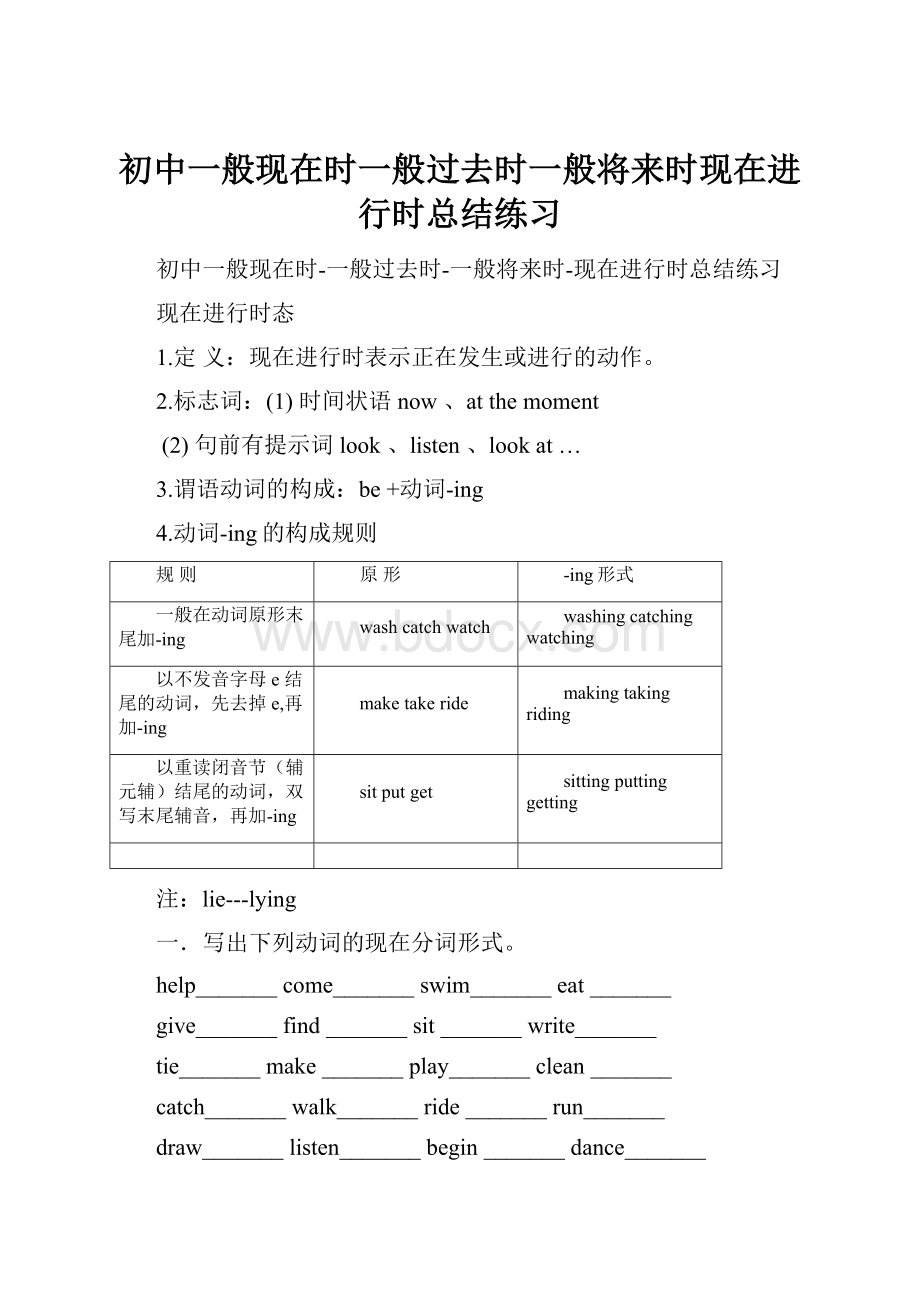初中一般现在时一般过去时一般将来时现在进行时总结练习.docx
《初中一般现在时一般过去时一般将来时现在进行时总结练习.docx》由会员分享,可在线阅读,更多相关《初中一般现在时一般过去时一般将来时现在进行时总结练习.docx(16页珍藏版)》请在冰豆网上搜索。

初中一般现在时一般过去时一般将来时现在进行时总结练习
初中一般现在时-一般过去时-一般将来时-现在进行时总结练习
现在进行时态
1.定义:
现在进行时表示正在发生或进行的动作。
2.标志词:
(1)时间状语now、atthemoment
(2)句前有提示词look、listen、lookat…
3.谓语动词的构成:
be+动词-ing
4.动词-ing的构成规则
规则
原形
-ing形式
一般在动词原形末尾加-ing
washcatchwatch
washingcatchingwatching
以不发音字母e结尾的动词,先去掉e,再加-ing
maketakeride
makingtakingriding
以重读闭音节(辅元辅)结尾的动词,双写末尾辅音,再加-ing
sitputget
sittingputtinggetting
注:
lie---lying
一.写出下列动词的现在分词形式。
help_______come_______swim_______eat_______
give_______find_______sit_______write_______
tie_______make_______play_______clean_______
catch_______walk_______ride_______run_______
draw_______listen_______begin_______dance_______
watch_______sleep_______see_______have_______
二.用所给词的适当形式填空。
1.Look!
Theboy(read)books.
( )5.Look!
Thecousins_____newsweaters.
A.arewearing B.wearing C.arewear D.iswearing
一般现在时
一、概述
一般现在时表示习惯性、经常性、反复性的动作或存在的状态。
“习惯性、经常性、反复性”是一般现在时的三大特性,它不表示特定时间内发生的事。
二、一般现在时的结构
1.句中有be动词时,用is,am,are
2.句中无be动词时,用动词原形。
若主语为第三人称单数,动词变成单三。
三、动词第三人称单数变化规则
1.一般在词尾加-s。
2.以-o,-s,-x,-sh,-ch结尾的加-es。
3.以辅音字母加y结尾的,变y为i,再加-es。
四、标志
频度副词,everyday,everyweek,everyyear…
1.写出下列动词的三单形式
go__________catch_________brush(刷)_____wash___________
do________like________have___________watch________
drink___________fly___________say_______learn___________
eat___________read___________sing___________buy__________
study_______stay__________make__________look____buy__________
pass__________carry____come__________plant(种植)______teach_______
2.用括号内动词的适当形式填空。
1.Weoften___________(play)intheplayground.
2.He_________(get)upatsixo’clock.
3.__________you_________(brush)yourteetheverymorning.
4.What________(do)heusually______(do)afterschool?
5.Danny_______(study)English,Chinese,Maths,ScienceandArtatschool.
6.Mikesometimes__________(go)totheparkwithhissister.
7.Ateightatnight,sheoften__________(watch)TVwithhisparents.
8.________Mike________(read)Englisheveryday?
9.Howmanylessons_________yourclassmate________(have)onMonday?
10.Whattime_________hismother_________(do)thehousework?
3.选择题
()1.I________toschoolat7:
00inthemorning.
A.goB.goingC.goes
()2.They_______bookseverydayinthelibrary.
A.readsB.readC.reading
()3.Themonkey________eatingbananasverymuch.
A.likeB.likesC.liking
()4.Myfather________toreadnewspaperaftersuppereveryday.
A.likeB.likesC.liking
()5.IlikewatchingTV,butmymother_________likeit.
A.don’tB.doesn’tC.does
()6.____________yourfatherdrinkmilkeveryday?
A.doB.areC.does
( )7.Wewillgoshoppingifit____tomorrow.
A.don'trainB.didn'trainC.doesn'trainD.isn'train
( )8.Hesaidthesun____intheeastand____inthewest.
Arose;setBrises;setsCrises,setDrise;sets
( )9.WangMei____musicandoften____tomusic.
Alike;listenBlikes;listensClike;arelisteningDliking;listen
( )10.Jenny____Englisheveryevening.
AhasstudyBstudiesCstudyDstudied
4.改错(划出错误的地方,将正确的写在横线上)
1.IsyourbrotherspeakEnglish?
__________________
2.Doeshelikesgoingfishing?
__________________
3.Helikesplaygamesafterclass.__________________
4.Mr.WuteachsusEnglish.__________________
5.Shedon'tdoherhomeworkonSundays._________________
5.把下列句子变成一般疑问句(并作肯定和否定回答)、否定句
1.Myfriendslikeplayingsoccer.
2.TheyspeakEnglisheveryday.
3.DanielwatchesTVeveryevening
4.JohnisfromCanada.
5.Tomdoeshishomeworkathome.
6.Mydogrunsfast.
7.Amylikesplayingcomputergames.
8.Shecanplaythepianowell.
一般将来时
1.定义:
表示将来发生的事或动作。
2.标志:
inthefuture,nextyear,nextday,in+时间段,tomorrow,
3.构成:
begoingto+动词原形
Will+动词原形
一、单项选择
( )1. There__________ameetingtomorrowafternoon.
A.willbegoingto B.willgoingtobeC.isgoingtobe D.willgotobe
( )2. Charlie________herenextmonth.
A.isn’tworking B.doesn’tworkingC.isn’tgoingtoworking D.won’twork
( )3. He________verybusythisweek,he________freenextweek.
A.willbe;is B.is;isC.willbe;willbe D.is;willbe
( )4. There________adolphinshowinthezootomorrowevening.
A.was B.isgoingtohaveC.willhave D.isgoingtobe
( )5. –_____you______freetomorrow?
–No.I_____freethedayaftertomorrow.
A.Are;goingto;will B.Are;goingtobe;will
C.Are;goingto;willbe D.Are;goingtobe;willbe
( )6. Mother________meanicepresentonmynextbirthday.
A.willgives B.willgiveC.gives D.give
( )7. –ShallIbuyacupofteaforyou?
–________.(不,不要。
)
A.No,youwon’t. B.No,youaren’t.C.No,pleasedon’t. D.No,please.
( )8. –Whereisthemorningpaper?
–I________ifforyouatonce.
A.get B.amgettingC.toget D.willget
( )9. ________aconcertnextSaturday?
A.Therewillbe B.WilltherebeC.Therecanbe D.Thereare
( )10.Iftheycome,we________ameeting.
A.have B.willhaveC.had D.wouldhave
( )11.He________herabeautifulhatonhernextbirthday.
A.gives B.gaveC.willgiving D.isgoingtogiving
( )12.He________tousassoonashegetsthere.
A.writes B.haswrittenC.willwrite D.wrote
( )13.He________inthreedays.
A.comingback B.camebackC.willcomeback D.isgoingtocomingback
( )14.Ifit________tomorrow,we’llgoroller-skating.
A.isn’train B.won’trainC.doesn’train D.doesn’tfine
( )15.–WillhisparentsgotoseetheTerraCottaWarriorstomorrow?
–No,________(不去).
A.theywilln’t. B.theywon’t.C.theyaren’t. D.theydon’t.
( )16.Who________we________swimmingwithtomorrowafternoon?
A.will;go B.do;goC.will;going D.shall;go
( )17.We________theworkthiswaynexttime.
A.do B.willdoC.goingtodo D.willdoing
( )18.Tomorrowhe___akiteintheopenairfirst,andthen____boatinginthepark.
A.willfly;willgo B.willfly;goesC.isgoingtofly;willgoes D.flies;willgo
( )19.Thedayaftertomorrowthey________avolleyballmatch.
A.willwatching B.watchesC.iswatching D.isgoingtowatch
( )20.There________abirthdaypartythisSunday.
A.shallbe B.willbeC.shallgoingtobe D.willgoingtobe
二、动词填空。
1.I______(leave)inaminute.I______(finish)allmyworkbeforeI______(leave).
2.—Howlong_____you_____(study)inourcountry?
—I_____(plan)tobehereforaboutonemoreyear.
—I_____(hope)tovisittheotherpartsofyourcountry.
—What______you______(do)afteryou______(leave)here?
—I______(return)homeand______(get)ajob.
3.I______(be)tired.I______(go)tobedearlytonight.
4.Mary’sbirthdayisnextMonday,hermother_____(give)herapresent.
5.Itisverycoldthesedays.It______(snow)soon.
6.—_____you_____(be)herethisSaturday?
—No.I______(visit)myteacher.
7.—______I______(get)youacopyoftoday’snewspaper?
—Thankyou.
8.Iamafraidthere______(be)ameetingthisafternoon.Ican’tjoinyou.
9.Mike______(believe,not)thisuntilhe______(see)itwithhisowneyes.
10.Mostofusdon’tthinktheirteam______(win).
三、用所给动词的一般将来时填空
1.I______(leave)inaminute.I______(finish)allmyworkbeforeI______(leave).
2.—Howlong_____you_____(study)inourcountry?
—I_____(plan)tobehereforaboutonemoreyear.
—I_____(hope)tovisittheotherpartsofyourcountry.
—What______you______(do)afteryou______(leave)here?
—I______(return)homeand______(get)ajob.
3.I______(be)tired.I______(go)tobedearlytonight.
4.Mary’sbirthdayisnextMonday,hermother_____(give)herapresent.
5.Itisverycoldthesedays.It______(snow)soon.
6.—_____you_____(be)herethisSaturday?
—No.I______(visit)myteacher.
7.—______I______(get)youacopyoftoday’snewspaper?
—Thankyou.
8.Iamafraidthere______(be)ameetingthisafternoon.Ican’tjoinyou.
9.Mike______(believe,not)thisuntilhe______(see)itwithhisowneyes.
10.Mostofusdon’tthinktheirteam______(win).
一般过去时
1.定义:
一般过去时表示过去某个时间发生的动作或存在的状态。
2.构成:
(1)句中若有be动词,用was或were;
(2)句中若无be动词,用实意动词过去式的形式。
3.标志:
in+年份,yesterday,last(day,week,month,year),justnow,thedaybeforeyesterday.
4.行为动词的一般过去式变化规则
①一般在动词原形末尾直接加上-ed。
如:
look-looked。
②以不发音的字母e结尾的动词,去e再加-ed。
如:
live-lived。
③末尾只有一个辅音字母的重读闭音节,先双写这个辅音字母,再加-ed。
如:
stop-stopped。
④末尾是辅音字母+y结尾的动词,先变y为i,然后再加-ed。
如:
study-studied。
二、用所给词的适当形式填空
1.Heputthebooksawayand________(go)home.
2.Theboyisrunningand________(tie)hisshoesontheplayground.
3.Myfather________(buy)anewcomputerfor________(I)yesterday.
4.Heoften______(go)toschoolbybike,butlastyearheoften_________(walk)toschool.
5.Aftershefinished_______(pack)everything,she________(go)tobed.
6.----Who______(wash)theplatesonthetable?
----Jennydid.
7.----When_______you_____(see)thefilm“Titanic”?
8.It’shalfpastelevennow.Jim_____(have)lunch.Heusually______(have)itatthistime.
9.She______(write)toJilllastmonth.She_________(write)tohimnexttime.
10.Thestudents________(stop)talkingwhentheirteachercameup.
三、单句改错:
下面每句均有一处错误,指出并加以改正
1.Didyoufoundtheanswertothisquestion?
2.Maryandherbrotherwasbornonthesameday.
3.Westartthislessonabouttenminutesago.
4.Shehadn’tanythingforbreakfastthismorning.
5.Theycamehereforayear.
6.